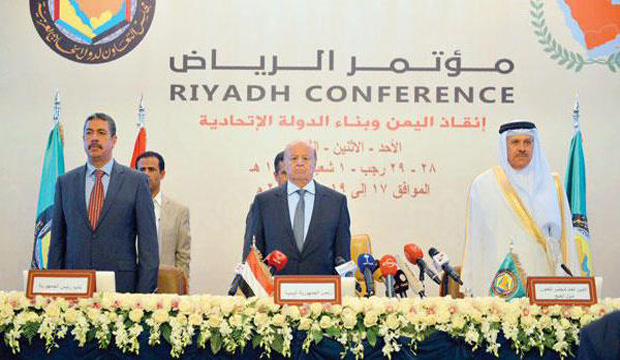
Yemeni Vice President Khaled Bahah (R), Yemeni President Abd Rabbuh Mansur Hadi (C) and GCC Secretary-General Abdullatif Al-Zayani at the Riyadh conference on Yemen in Riyadh, Saudi Arabia, on May 19, 2015. (SPA)
Riyadh, Asharq Al-Awsat—The Riyadh conference on Yemen concluded on Tuesday with calls for the establishment of safe zones in the war-torn country to allow the legitimate government to resume its duties and the formation of a joint Arab force to help secure major cities from the Houthi rebel movement.
The three-day conference, chaired by Saudi King Salman Bin Abdulaziz, was also attended by Yemen’s government in exile and a broad range of Yemeni political parties. The Iran-backed Shi’ite Houthi militia and political supporters of ex-president Ali Abdullah Saleh refused to attend. Gulf Cooperation Council (GCC) Secretary-General Abdullatif Al-Zayani also attended the meeting.
The conference emerged with a number of “aims” in what has been dubbed the Riyadh Document, which are intended to help resolve the ongoing conflict in the Arabian Peninsula state between supporters of legitimate President Abd Rabbuh Mansur Hadi and militias backing the Houthi-Saleh coup.
The Riyadh Document called for the “maintenance of security and stability in Yemen” and the “rejection of the coup and putting an end to its consequences.”
The document called for “safe zones” to be established within Yemeni territory as soon as possible to allow Yemen’s legitimate government to resume its duties in the country.
The document also called on the UN, GCC and Arab League to form a joint Arab military force to secure Yemen’s major cities and push back the Houthi-Saleh rebel forces.
The conference ended with a number of other decisions, including pledges for greater aid to relieve the deteriorating humanitarian situation in the country.
Speaking at a press conference following the talks, Yemeni President Abd Rabbuh Mansur Hadi confirmed that his government is continuing to supporting the “resistance” against Houthi-Saleh rebel fighters, calling for faster delivery of logistical equipment and arms to pro-government forces.
Despite this, he acknowledged that there can be no military solution to the conflict, adding that the objective is to pressure the rebels into sitting down at the negotiating table.
“Dialogue is the only way to take Yemen out of its deadlock,” Hadi said, adding that any dialogue must take place according to UN Security Council Resolution 2216, which calls on the Houthis to lay down their arms and relinquish the territory they have seized.
In comments to Asharq Al-Awsat, former Yemeni Prime Minister Hayder Abu Bakr Al-Attas praised the Riyadh conference while calling on ex-president Saleh to surrender.
“If he [Saleh] respected the Yemeni people, as he continually claims, he should surrender and leave the country, otherwise he will share the fate of Iraqi dictator Saddam Hussein or Libyan dictator Muammar Gaddafi,” he said.
